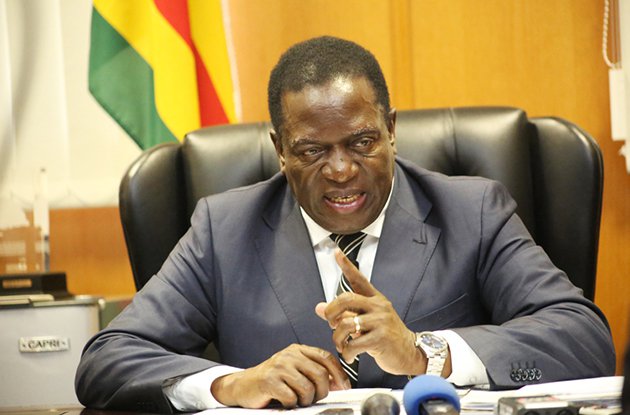News / Local
Mnangagwa must not deliver another Lima
26 May 2023 at 05:41hrs |
1 Views

WHITE commercial farmers forced off their land over 20 years ago have waited since 2018 — when government agreed to a compensation deal — to receive their settlements. It is important to note that these farmers compromised and agreed to take US$3,5 billion. In the same spirit, Zimbabwe should also compromise and demonstrate that it is taking this issue seriously.
President Emmerson Mnangagwa must stick to his commitment and pay them, in line with the Global Settlement Deed (GSD), as agreed in 2018. Before Mnangagwa took over the presidency five years ago, the late former strongman, Robert Mugabe had denied responsibility.
But the blowbacks from angry western powers were deadly.
Zimbabwe's economy surrendered 50% of its gross domestic product (GDP) within the first decade of the confrontations.
Its currency collapsed in December 2008.
To demonstrate that western creditors owed over US$13,5 billion, almost half of Zimbabwe's US$30 billion GDP, take this issue seriously, it stuck out during last week's debt summits in Harare and Victoria Falls.
It was not a coincidence that those leading the plan brought it up for discussion soon after jetting in from Washington, where a law — the Zimbabwe Democracy and Economic Recovery Act (Zidera) — was enacted in 2000 during bloody farm invasions.
They knew what they were doing. They want to persuade Washington and other powers that Zimbabwe is taking steps to address Zidera's concerns. This is vital for them to secure global confidence that Harare is ready to reform, before getting a debt deal.
Rightly so, western creditors have raised issues of fundamental concern to humanity. Harare must end impunity and rights violations. It must change from a tradition of disputed polls to holding credible elections from this year and beyond.
No one disputes that these are important milestones to be achieved.
Their continuing to overshadow Zimbabwe's electoral and political landscape has caused immense suffering. The world cannot not fold arms when everything is going wrong. But the longer Zimbabwe procrastinates, the more dire the endgame.
Isolation will be prolonged and the debt pile up will be out of control. With regards to the GSD, Mnangagwa must not take chances.
Yes, everybody knows that he is leading a government that is bleeding on all fronts, following decades of kleptocracy. But he knows that the farmers invested to make Zimbabwe's land productive.
Zimbabwe's agricultural success is riding on a foundation that they laid before they were chased out. As we reported last week, the plan to pay them through Treasury Bills (TBs) won't work.
Like a payslip, a TB only represents an intention to pay. Broke governments have always rolled over TBs on maturity. It will be foolhardy for Zimbabwe to think that these farmers will agree to live on a promise. But the longer this dispute plays out, the more Mnangagwa's re-engagement plan suffers. A similar debt clearance plan was cobbled in Lima, Peru, in 2015. It flopped because Mugabe was not keen to compromise.
Sure, Zimbabweans don't want another Lima.
President Emmerson Mnangagwa must stick to his commitment and pay them, in line with the Global Settlement Deed (GSD), as agreed in 2018. Before Mnangagwa took over the presidency five years ago, the late former strongman, Robert Mugabe had denied responsibility.
But the blowbacks from angry western powers were deadly.
Zimbabwe's economy surrendered 50% of its gross domestic product (GDP) within the first decade of the confrontations.
Its currency collapsed in December 2008.
To demonstrate that western creditors owed over US$13,5 billion, almost half of Zimbabwe's US$30 billion GDP, take this issue seriously, it stuck out during last week's debt summits in Harare and Victoria Falls.
It was not a coincidence that those leading the plan brought it up for discussion soon after jetting in from Washington, where a law — the Zimbabwe Democracy and Economic Recovery Act (Zidera) — was enacted in 2000 during bloody farm invasions.
They knew what they were doing. They want to persuade Washington and other powers that Zimbabwe is taking steps to address Zidera's concerns. This is vital for them to secure global confidence that Harare is ready to reform, before getting a debt deal.
No one disputes that these are important milestones to be achieved.
Their continuing to overshadow Zimbabwe's electoral and political landscape has caused immense suffering. The world cannot not fold arms when everything is going wrong. But the longer Zimbabwe procrastinates, the more dire the endgame.
Isolation will be prolonged and the debt pile up will be out of control. With regards to the GSD, Mnangagwa must not take chances.
Yes, everybody knows that he is leading a government that is bleeding on all fronts, following decades of kleptocracy. But he knows that the farmers invested to make Zimbabwe's land productive.
Zimbabwe's agricultural success is riding on a foundation that they laid before they were chased out. As we reported last week, the plan to pay them through Treasury Bills (TBs) won't work.
Like a payslip, a TB only represents an intention to pay. Broke governments have always rolled over TBs on maturity. It will be foolhardy for Zimbabwe to think that these farmers will agree to live on a promise. But the longer this dispute plays out, the more Mnangagwa's re-engagement plan suffers. A similar debt clearance plan was cobbled in Lima, Peru, in 2015. It flopped because Mugabe was not keen to compromise.
Sure, Zimbabweans don't want another Lima.
Source - the independent
Join the discussion
Loading comments…































